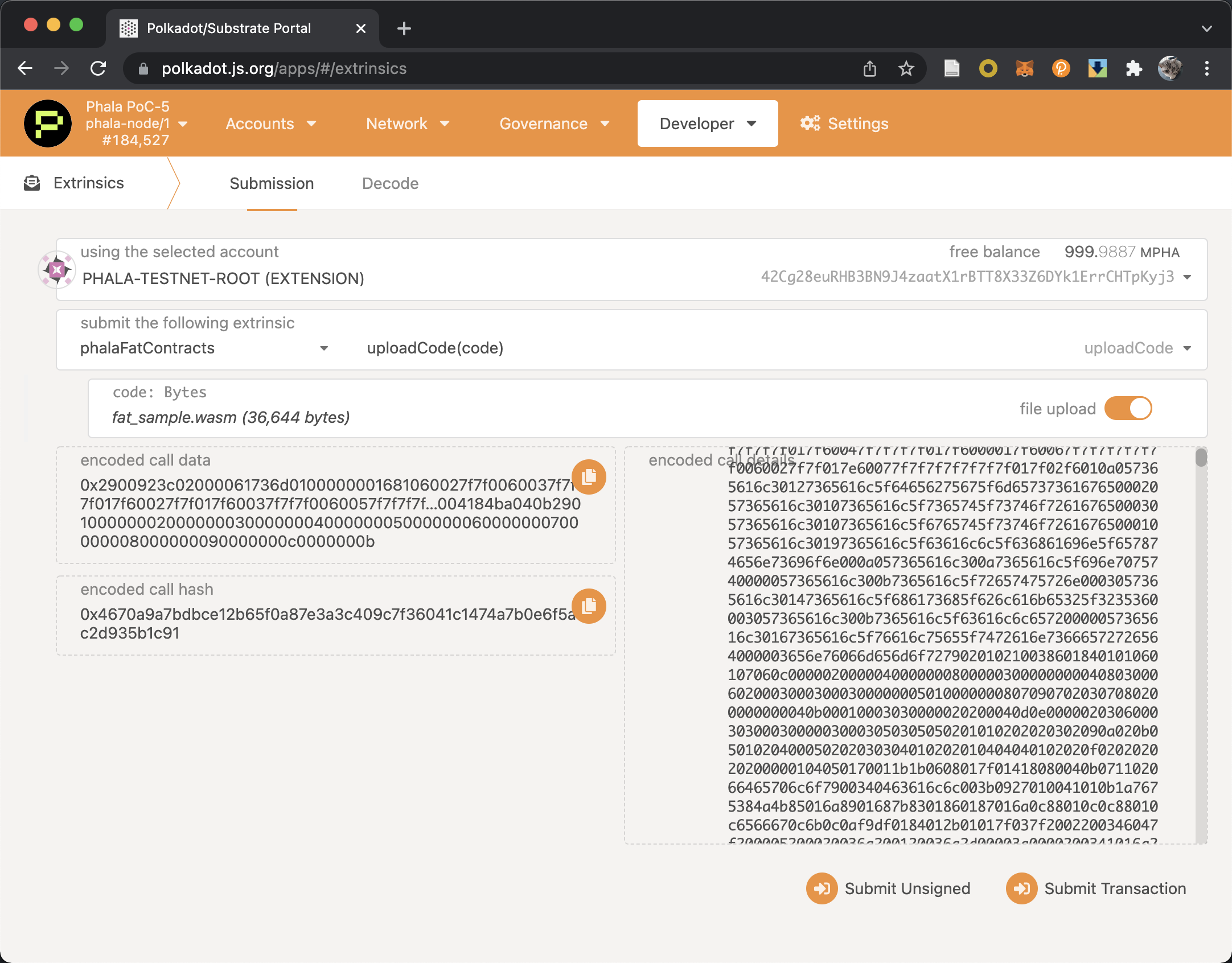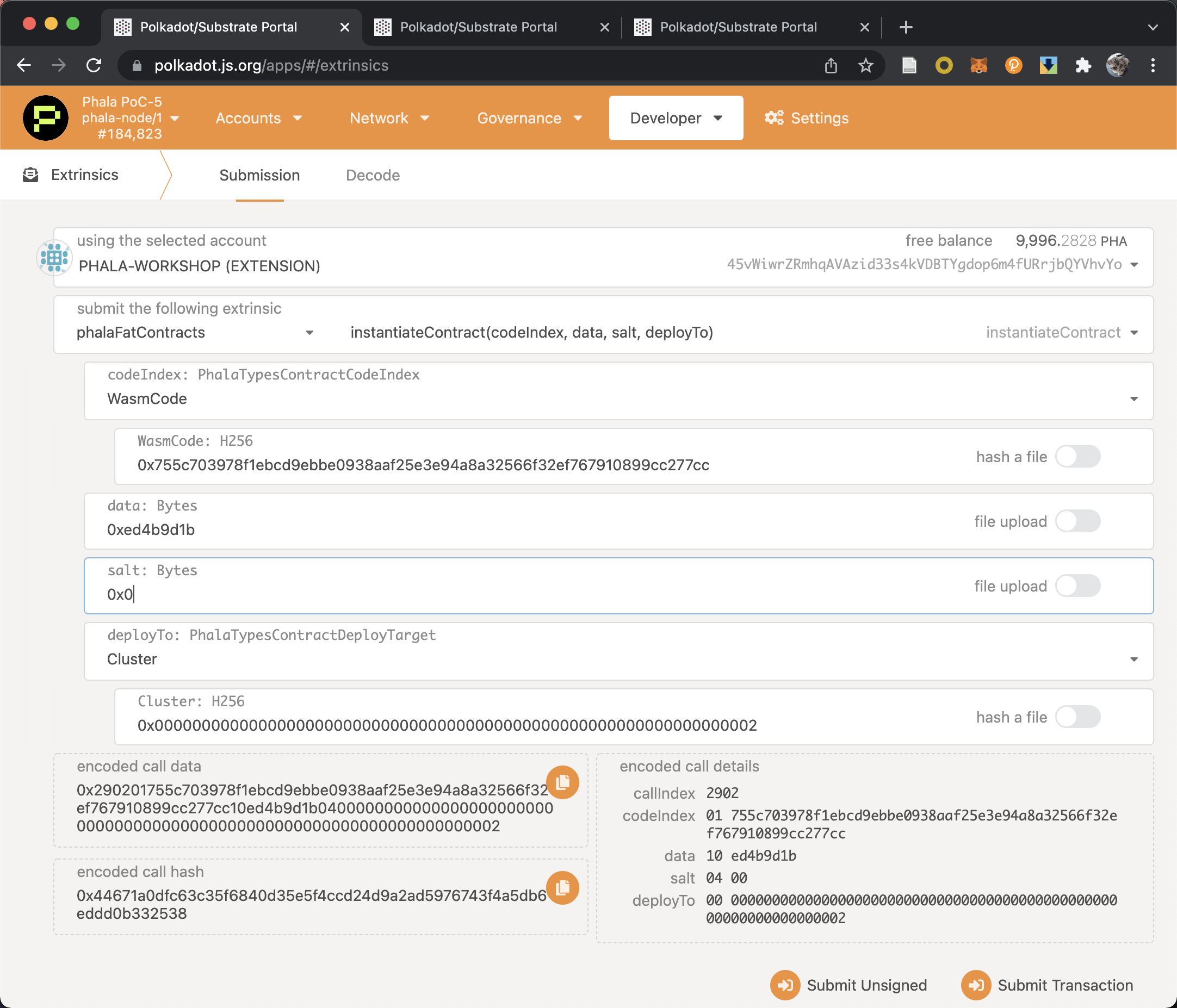This workshop will demonstrate how to make an HTTPS request to OnFinality RPC nodes.
Fat Contract is the programming model adopted by Phala Network. Fat Contract is NOT smart contract.
Instead, it aims to provide the rich features that ordinary smart contracts cannot offer, including:
- CPU extensive computation: exclusive off-chain execution at the full CPU speed
- Network access: the ability to send the HTTP requests
- Low latency: non-consensus-sensitive operations may not hit the blockchain at all, removing the block latency
- Strong consistency: consensus-sensitive operations remain globally consistent
- Confidentiality: contract state is hidden by default unless you specifically expose it via the read call
Fat Contract is 100% compatible with Substrate's pallet-contracts. It fully supports the unmodified ink! smart contracts. Therefore you can still stick to your favorite toolchain including cargo-contract, @polkadot/contract-api, and the Polkadot.js Extension.
This workshop will demonstrate how to make an HTTPS request to OnFinality RPC nodes.
An operating system of macOS or Linux systems like Ubuntu 18.04/20.04 is recommended for the workshop.
- For macOS users, we recommend to use the Homebrew package manager to install the dependencies
- For other Linux distribution users, use the package manager with the system like Apt/Yum
The following toolchains are needed:
- Rust toolchain
- Install rustup, rustup is the "package manager" of different versions of Rust compilers:
curl --proto '=https' --tlsv1.2 -sSf https://sh.rustup.rs | sh - This will install
rustupandcargo
- Install rustup, rustup is the "package manager" of different versions of Rust compilers:
- Ink! Contract toolchain
- Install frontend toolchain
- Node.js (>=v16), follow the official tutorial
- Yarn (v1):
npm install --global yarn
Check your installation with
$ rustup toolchain list
# stable-x86_64-unknown-linux-gnu (default)
# nightly-x86_64-unknown-linux-gnu
$ cargo --version
# cargo 1.58.0 (f01b232bc 2022-01-19)
$ cargo contract --version
# cargo-contract 0.17.0-unknown-x86_64-linux-gnu
$ node --version
# v17.5.0
$ yarn --version
# 1.22.17- Install Polkadot.js extension and import the Phala gas account following the tutorial
- Gas account seed:
misery blind turtle lottery random chalk flight fresh cute vanish elephant defy
- Gas account seed:
- Connect to Phala Testnet
- Open https://polkadot.js.org/apps/;
- Click left top to switch network;
- Choose
Test Networks-Phala(PoC 5)and clickSwitchat the top;
- Send some coins to your own account (limited, don't be evil);
- Create your own account following tutorial
- Send some coins.
cargo +nightly contract buildAlso test to ensure everything is fine
cargo +nightly contract testYou will find the compile result at ./target/ink:
$ ls -h target/ink
# fat_sample.wasm metadata.json ...Collect the above two files and create the contract in Phala Testnet (PoC 5). The contract deployment can be divided into two steps: code upload and contract instantiation.
We recommend to keep a tab for explorer so you will not miss any historical events.
Choose Developer - Extrinsics, and select the extrinsic phalaFatContracts and uploadCode, drag the fat_sample.wasm file and send the transaction.
A event of phalaFatContracts.CodeUploaded should be observed in the block explorer with the code hash, also you can go to Developer - Chain state and select the extrinsic phalaFatContracts and code to see the existing code.
Code upload could failed if the wasm code is already on chain.
Choose Developer - Extrinsics, and select the extrinsic phalaFatContracts and instantiateCode. We explain the arguments as follow:
codeIndex: the code to use, chooseWasmCodeand type in the hash of you uploaded codedata: the instantiation argument. We shall call the constructor function of the contract will the specific function selector. This can be found in themetadata.json(in this case,0xed4b9d1b)
...
"constructors": [
{
"args": [],
"docs": [],
"label": "default",
"payable": false,
"selector": "0xed4b9d1b"
}
],
...salt: some random bytes to prevent collision, like0x0or0x1234deployTo: we have prepared a cluster with0x0000000000000000000000000000000000000000000000000000000000000001. In the future, customized cluster will be enabled.
There are three events to observe, all these events contain your contract ID
phalaFatContracts.Instantiating, the chain has receive your request and start instanting;phalaFatContracts.PubkeyAvailable, the gatekeeper has generated the contract key to encrypt its state and input/output;phalaFatContracts.Instantiated, your contract is successfully instantiated.
You can go to Developer - Chain state and select the extrinsic phalaFatContracts and contracts to see all the contracts.
For now, the contract execution log is not directly available to the developers. Join our Discord and we can help forward the Worker logs if necessary.
Phala provides js-sdk to simplified the frontend development. It already contains the frontend for the demo contract, check its example folder.
Follow the steps to run the frontend
-
Download Phala-Network/js-sdk
git clone --branch ethdenver-2022 https://github.com/Phala-Network/js-sdk.git
-
Compile and run the frontend. By default it will serve the app at http://localhost:3000:
cd js-sdk yarn yarn dev
You shall see the identical page as we have deployed.
- ETHDenver 2022
- JS SDK (with the UI scaffold)
- ink! Docs
- Polkadot.js Docs
- Join Discord #dev and #hackathon groups!
- Chain:
wss://poc5.phala.network/ws- Polkadot.js quick link: https://polkadot.js.org/apps/?rpc=wss%3A%2F%2Fpoc5.phala.network%2Fws#/explorer
- Workers (with their identity key)
- https://poc5.phala.network/tee-api-1
- 0x94a2ded4c77fbb910943f7e452e4d243ee5b60bf1a838a911acf2ffd4bae9b63
- https://poc5.phala.network/tee-api-2
- 0x50ede2dd7c65716a2d55bb945dfa28d951879154f832e049851d7882c288db76
- https://poc5.phala.network/tee-api-3
- 0xfe26077a6030e505136855100f335503ca40f6e8afa149b0c6c618e81c1cb53b
- https://poc5.phala.network/tee-api-4
- 0x6cfc1282880305c7691f0941b98089b9da17acde43b66ef2220022797bb3e370
- https://poc5.phala.network/tee-api-5
- 0xbed94c30d660a1de5a499e38f9f3afe9ccc1ef5f901530efd48de641679fbc7d
- https://poc5.phala.network/tee-api-1


